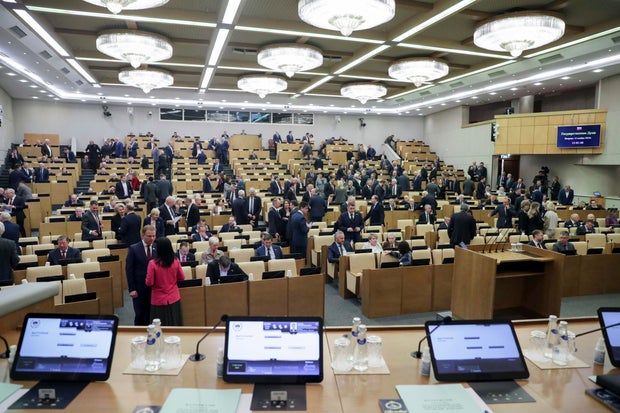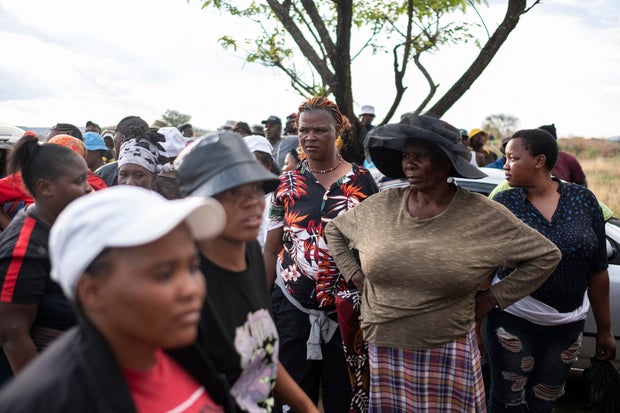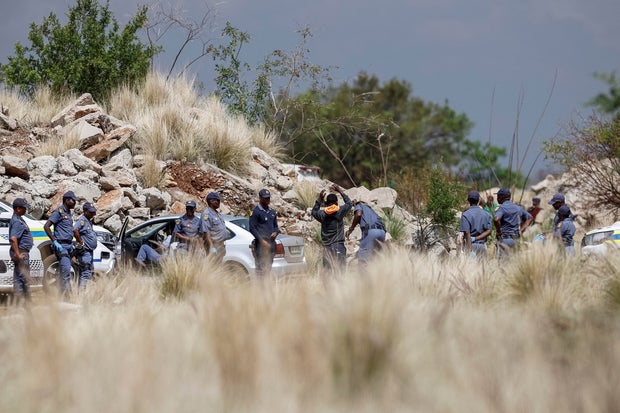CBS News
Russia lawmakers pass bill banning “child-free propaganda”

Moscow — Russian lawmakers on Tuesday passed controversial legislation banning “propaganda” that urges people to opt against having children, the latest measure targeting what Moscow depicts as Western liberal ideas. Facing an ageing population and low birth rates, Moscow is seeking to reverse a demographic slump — accentuated by its ongoing full-scale invasion of neighboring Ukraine — that threatens its economic future.
Members of the Russian parliament’s lower house, the Duma, voted unanimously in favor of the draft bill, which would apply to materials online, in media, advertising and in films that promote a “rejection of childbearing.”
The bill targets “destructive content” that promotes a “conscious” rejection of having children.
The bill’s authors have said it will not be used as punishment for “a personal choice or lifestyle” but only for promoting such a lifestyle, although it is unclear how this would be differentiated in practice.
Under the ban on “child-free propaganda,” violations would be punishable by fines up to 400,000 rubles (about $4,000) on individuals and up to 5 million rubles, or about $51,000, for businesses. The bill also includes a provision to deport foreigners found guilty of disseminating the banned information.
“This is a fateful law… Without children, there will be no country. This ideology will lead to people stopping giving birth to children,” the Duma’s speaker Vyacheslav Volodin said ahead of the vote.
Russian State Duma/AP
He also said the legislation was about “protecting citizens, primarily the generation growing up, from information spread in the media space that negatively affects the development of personality.”
The effort was “so new generations of our citizens grow up orientated towards traditional family values”, he said.
Nina Ostanina, a Communist Party lawmaker who heads the Duma committee on family policy, said the bill aims to “guard our youth from unnecessary ideologies.”
The legislation will now be considered by the upper house of parliament on November 20, before coming before President Vladimir Putin, who is expected to sign it into law.
It comes on top of existing bans on “propaganda” of LGBTQ relationships or changing gender.
The Duma also unanimously passed legislation Tuesday banning foreigners living in countries that allow gender reassignment from adopting Russian children. The bill is aimed at stopping Russian-born children being able to legally change their gender.
Moscow has long portrayed itself as a bulwark against liberal values, but that trend has hugely accelerated since the Kremlin launched its Ukraine offensive, further rupturing ties with the West.
The bill would ban adoption by citizens of countries that authorize “the change of sex by medical intervention, including with the use of medicine,” or allow individuals to change their gender on official identity documents.
Since 1993, foreigners have adopted 102,403 children from Russia, Volodin said, warning that “Western policy towards children is destructive.”
Russia previously banned all U.S. adoptions in 2012 with a bill named after a Russian toddler who died of heat stroke in 2008 after his adoptive American father forgot him in a car.
Russia has created an inhospitable environment for LBGTQ people for years. In July 2023, it banned the “international LGBT movement” as extremist and made gender reassignment illegal.
Putin himself has repeatedly mocked people who have undergone gender reassignment as well as LGBTQ people.
CBS News
The Onion buys Infowars out of bankruptcy in move backed by Sandy Hook families

Watch CBS News
Be the first to know
Get browser notifications for breaking news, live events, and exclusive reporting.
CBS News
Famed Russian chef, a Putin critic who owned a restaurant in London, found dead in Belgrade

A famed Russian chef who has been highly critical of Moscow’s war in Ukraine has been found dead while on a visit to Serbia’s capital, according to several sources on Wednesday.
The death of Alexei Zimin, who has been based in London for years, marks the latest passing of a Russian expatriate critical of the Kremlin’s war.
Zimin co-founded the ZIMA restaurant in London, served as senior contributor in numerous magazines and has co-authored several books, according to a ZIMA Instagram post.
His body was found late on Tuesday in a flat that he was renting in Belgrade while on a visit to promote his latest book, “Anglomania,” a source close to the investigation told AFP.
Prosecutors told CBS News’ partner network BBC News that the flat was locked from the inside and the death did not appear to be suspicious, but that an autopsy was due to take place.
Born in Russia in 1971, Zimin had opened several restaurants in Moscow before leaving after Russia occupied Ukraine’s Crimea peninsula in 2014.
After Russia invaded Ukraine in February 2022, he posted anti-war messages and stopped his Saturday cooking show on a pro-Kremlin television station.
“Throughout his remarkable life, Alexei accomplished a lot – he served as deputy editor-in-chief of Afisha magazine, founded Afisha.Food, also worked as editor-in-chief of Afisha World, GQ, and Gourmet,” his London restaurant ZIMA said in an Instagram post on Wednesday.
“He hosted several culinary shows, authored numerous books, and launched multiple successful restaurants,” it said.
“To us, Alexei was not only a colleague but also a friend, a close companion with whom we shared many experiences – good, kind, and at times sorrowful.”
In May 2022, Zimin told the BBC his restaurant had been targeted with abuse and arson threats after Russia’s invasion.
“My partners thought about changing the name,” he said at the time.
Dozens of Vladimir Putin’s enemies have suffered mysterious deaths in Russia and Europe and Matt Olsen, head of the National Security Division at the Justice Department, told “60 Minutes” that he is concerned Russia’s reach could extend into the U.S.
There have been falls from windows, poisonings and unsolved shootings outside the U.S., among other suspicious deaths. Inside the U.S., there have been attempts to interfere in elections, cyber attacks and actions putting critical infrastructure at risk, Olsen said.
“I don’t think Putin is trying to hide his hand. I think quite the opposite,” Olsen said. “I think … they’re going after their critics: both to eliminate the critics but also to send a stark and chilling message.”
CBS News
4,000 miners cut off from supplies in underground standoff over illegal mining in South Africa

Johannesburg — More than 4,000 miners locked in a standoff with South African authorities over illegal mining were believed to be sick and increasingly weak inside an abandoned mine shaft Thursday. South African police confirm the partly decomposed body of one miner had been brought to the surface from inside the Stilfontein mine in the country’s North West province Thursday morning.
Five of the unlicensed miners were pulled out alive Wednesday, all of them appearing frail and weak after apparently being underground for several months.
Illegal miners — known locally as Zama Zama — are often men from neighboring countries who come to South Africa without the paperwork necessary to find legal work. Many say they have no choice but to go underground and work in illegal mines to make a living.
EMMANUEL CROSET/AFP/Getty
South Africa’s abandoned gold mines are often targeted by illegal miners looking for gold and other minerals left behind by the previous commercial operations.
Khumbudzo Ntshavheni, a senior government official who holds the role of Minister in the Presidency, told journalists on Wednesday that authorities would not help the Zama Zamas in the Stilfontein mine, but would instead “smoke them out.”
“We will not send help to criminals. We are not sending help. We will smoke them out. They are not to be helped but persecuted. We didn’t send them there and they didn’t go down there for the good intentions of the country, so we cannot help them,” she said. “When they come out, we will arrest them.”
South African police and military forces leading the operation to detain the illegal miners and shut down the operation — dubbed Vala Umgodi (Close the Hole) — decided this week to block all entrances to the mine to prevent any more food being carried underground. More than 1,000 men have come to the surface and been arrested since the operation began several weeks ago.
EMMANUEL CROSET/AFP/Getty
Those who’ve resurfaced have said they were below ground for several months.
David Van Wyk, a mining analyst and researcher at the Bench-Marks Foundation, said Thursday on a local radio show that he believed Ntshavheni “should read the constitution, and the right to life is sacrosanct, regardless of who you are.”
“People have a right to a fair trial, and you can’t say they are criminal without a fair trial,” said Van Wyk.
Volunteers who have helped bring some of the weakened miners to the surface have also carried up letters up from those still underground. Many have said in the letters that they simply don’t have the strength to come up.
Some of the volunteers have reported a strong smell of rotting flesh underground.
Local community members have been protesting outside the mine, carrying placards reading: “Free our Brothers,” and shouting that family members have been trapped underground for months.
Just outside the mine’s entrance, several woman have been cooking food in large pots to offer to any miners who do come to the surface.
“I am working here, but I am not bothering any human,” said one of the Zama Zama, who wouldn’t give his name but said he was in the mine for several months. “I am just feeding my family.”










